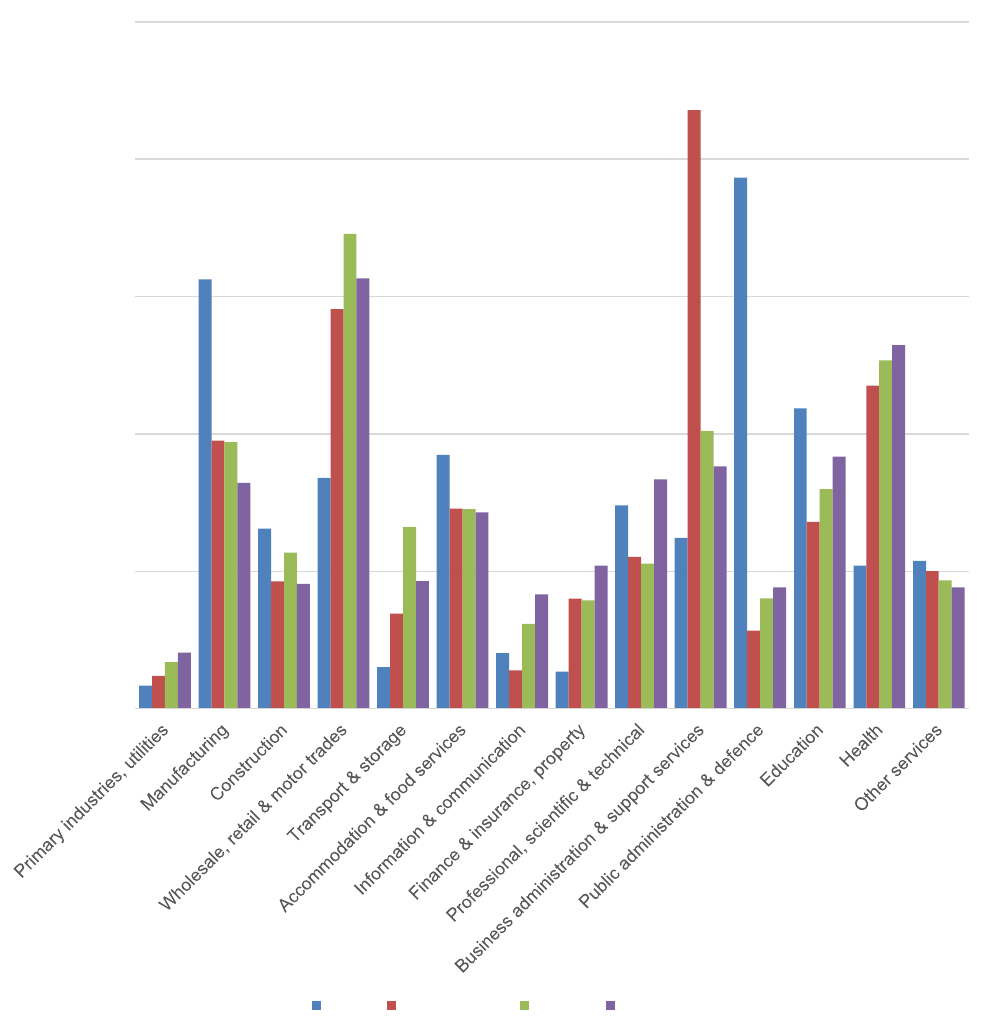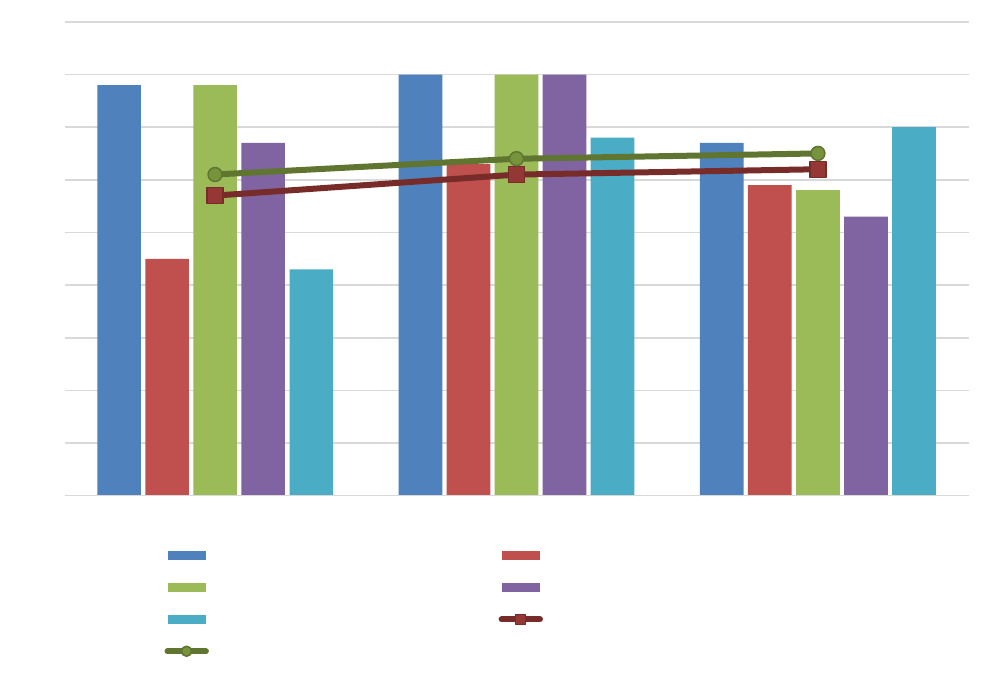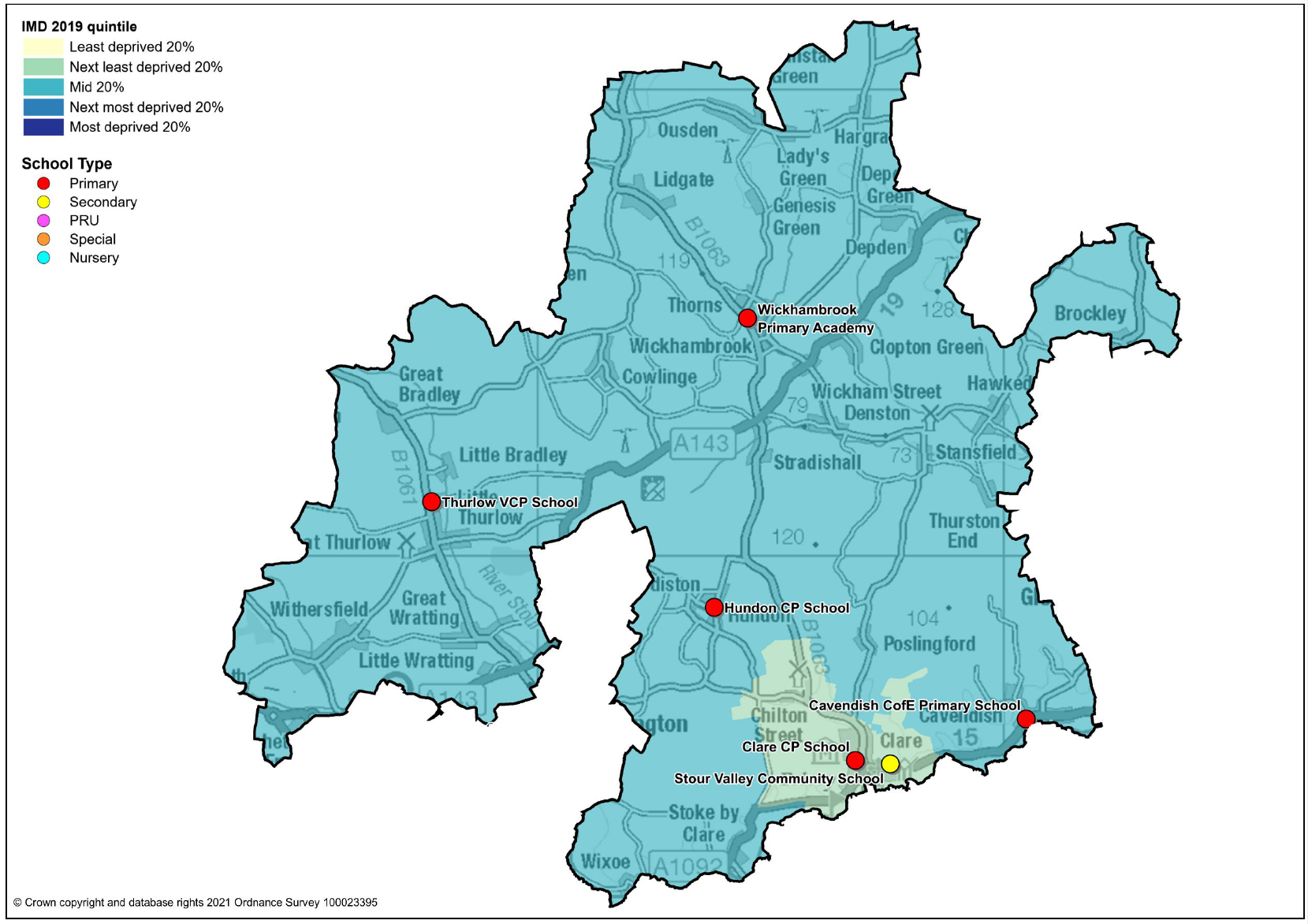
CLARE
ELECTORAL DIVISION PROFILE 2021
This Division comprises Withersfield Ward in its entirety plus part of
Whepstead & Wickhambrook, Clare, Hundon & Kedington and Chedburgh &
Chevington Wards
www.suffolkobservatory.info

© Crown copyright and database rights 2021 Ordnance Survey 100023395
3
CONTENTS
▪ Demographic Profile: Age & Ethnicity
▪ Economy and Labour Market
▪ Schools & NEET
▪ Index of Multiple Deprivation
▪ Health
▪ Community Safety
▪ Data Sources

4
ELECTORAL DIVISION PROFILES: AN INTRODUCTION
These profiles have been produced to support elected members, constituents and other
interested parties in understanding the demographic, economic, social and educational
profile of their neighbourhoods. We have used the latest data available at the time of
publication.
Much more data is available from national and local sources than is captured here, but it is
hoped that the profile will be a useful starting point for discussion, where local knowledge and
experience can be used to flesh out and illuminate the information presented here.
The profile can be used to help look at some fundamental questions e.g.
• Does the age profile of the population match or differ from the national profile?
• Is there evidence of the ageing profile of the county in all the wards in the Division or just
some?
• How diverse is the community in terms of ethnicity?
• What is the impact of deprivation on families and residents?
• Does there seem to be a link between deprivation and school performance?
• What is the breakdown of employment sectors in the area?
• Is it a relatively healthy area compared to the rest of the district or county?
• What sort of crime is prevalent in the community?
A vast amount of additional data is available on the Suffolk Observatory
www.suffolkobservatory.info
The Suffolk Observatory is a free online resource that contains all Suffolk’s vital statistics; it is
the one-stop-shop for information and intelligence about Suffolk. Through data, reports and
maps, the Suffolk Observatory provides a comprehensive picture of the County. It is a great
source for useful facts and figures that can be used for writing reports and presentations,
informing strategic and business planning, preparing funding applications or supporting
academic research. Data is presented around the key themes of population, children and
young people, health and social care, housing, crime and community safety, deprivation,
economy and employment and environment. All areas of the county are covered, right down
to district, electoral division, ward and parish level, with information easily accessible in a
variety of formats. You can also build your own reports for custom areas.
Technical Notes:
1. Where electoral divisions do not exactly match the boundaries at which the data is
available (e.g. ward, Output Area or Lower Super Output Area), we have adopted a
“best-fit” approach to produce a dataset.
2. District, county and national level data is provided where possible to provide a context
for comparisons. Where possible we have used the most recent district boundaries for
comparison purposes, but in some cases it has been necessary to use the pre-2019
districts.

5
DEMOGRAPHIC PROFILE - AGE
In mid-2019, the population of Clare stood at 11,811, an increase of 3.2% since the 2011
Census. The age structure of the component wards and the division as a whole is set out
below.
Clare Division
Clare, Hundon
& Kedington
Withersfield
Whepstead &
Wickhambrook
Chedburgh &
Chevington
All Ages
11,811
6,370
2,440
2,054
947
0-4
451
229
119
68
35
5-9
515
282
92
96
45
10-14
568
313
97
113
45
15-19
496
245
94
93
64
20-24
485
255
134
65
31
25-29
624
372
158
65
29
30-34
741
392
230
89
30
35-39
636
372
143
85
36
40-44
609
342
122
108
37
45-49
838
442
187
134
75
50-54
896
456
192
156
92
55-59
984
480
223
182
99
60-64
851
417
171
191
72
65-69
813
430
140
167
76
70-74
907
517
136
184
70
75-79
623
345
109
115
54
80-84
393
242
57
65
29
85-89
236
139
30
48
19
90+
145
100
6
30
9
▪ The age pyramid for Clare shows a higher-than-average proportion of people over the
age of 50, particularly females.
10% 8% 6% 4% 2% 0% 2% 4% 6% 8% 10%
0-4
5-9
10-14
15-19
20-24
25-29
30-34
35-39
40-44
45-49
50-54
55-59
60-64
65-69
70-74
75-79
80-84
85-89
90+
England - females England - males Clare - females Clare - males

6
▪ The most common age group in Clare is 55-59, followed by 70-74.
▪ There are much lower numbers of people under the age of 40 than the national average,
in particular females aged 20-40.
▪ There is a large proportion of males aged 30-34 in the division due to the presence of
HMP Highpoint.
ETHNICITY (%)
▪ According to the latest data (2011 Census), 94.9% (10,851) of the population of Clare are
white.
▪ There is a slightly lower proportion, 5.1%, of people of minority ethnic origin in the
division, compared to West Suffolk.
▪ The diversity profile of Clare is broadly similar to both West Suffolk and the county as a
whole.
All
people
White
White British
Mixed
Asian and
Asian
British
Black and
Black
British
Other
Ethnic
Group
Total
minority
ethnic
population
Count
Count
%
Count
%
Count
%
Count
%
Count
%
Count
%
Count
%
Clare
11,440
10,851
94.9
10,433
91.2
148
1.3
169
1.5
247
2.2
25
0.2
589
5.1
West Suffolk
170,756
161,522
94.6
147,381
86.3
3,148
1.8
3,087
1.8
2,198
1.3
801
0.5
9,234
5.4
Suffolk
728,163
693,195
95.2
661,458
90.8
12,472
1.7
13,131
1.8
6,854
0.9
2,511
0.3
34,968
4.8
England
85.4
79.8
2.3
7.8
3.5
1.0
14.6
0%
10%
20%
30%
40%
50%
60%
70%
80%
90%
100%
Clare West Suffolk Suffolk England

7
ECONOMY
There are 3,000 people employed in Clare.
▪ The key employment sectors in Clare are public administration and defence and
manufacturing.
▪ These sectors are particularly important as they employ a larger proportion of people in
Clare than the national average; more than a third of employees in the division work in
these sectors.
▪ Education, accommodation and food services and wholesale, retail and motor trades also
account for between 1 in 9 and 1 in 11 jobs in the Clare.
0%
5%
10%
15%
20%
25%
Clare West Suffolk Suffolk England

8
LABOUR MARKET
OUT-OF-WORK BENEFIT CLAIMANT RATE
▪ Clare saw a sharp increase in claimants of out-of-work benefits in the first half of 2020 as
a result of the COVID-19 pandemic, much like the rest of the county and indeed England
as a whole.
▪ Claimant unemployment levels in the division are consistently below those of the district,
county and England as a whole.
▪ In percentage terms, approximately 3.5% of the working age population of Clare are
claiming out-of-work benefits in January 2021.
0%
1%
2%
3%
4%
5%
6%
7%
Jan-18
Feb-18
Mar-18
Apr-18
May-18
Jun-18
Jul-18
Aug-18
Sep-18
Oct-18
Nov-18
Dec-18
Jan-19
Feb-19
Mar-19
Apr-19
May-19
Jun-19
Jul-19
Aug-19
Sep-19
Oct-19
Nov-19
Dec-19
Jan-20
Feb-20
Mar-20
Apr-20
May-20
Jun-20
Jul-20
Aug-20
Sep-20
Oct-20
Nov-20
Dec-20
Jan-21
Clare West Suffolk Suffolk England

9
SCHOOLS
SCHOOL INFORMATION
Schools in the Division
Average cohort
size at:
Name
Phase
Academy
Status
Foundation
Stage (age 5)
KS2 (age 11)
KS4 (age 16)
KS5 (age 18)
Latest
Ofsted
Latest
Ofsted
Date
Cavendish CofE Primary School
Primary
LA
13
9
0
0
Good
07/03/2013
Clare Community Primary School
Primary
AS
24
30
0
0
Good*
13/02/2020
Hundon Community Primary School
Primary
LA
11
13
0
0
Good
05/03/2020
Thurlow VCP School
Primary
LA
14
14
0
0
Good
03/05/2013
Wickhambrook Primary Academy
Primary
AC
25
20
0
0
Outstanding*
29/02/2012
Stour Valley Community School
Secondary
F
0
0
110
0
Good
11/07/2013
Schools with catchments that overlap with the Division
Average cohort size at:
Name
Phase
Academy
Status
Foundation
Stage (age 5)
KS2 (age 11)
KS4 (age 16)
KS5 (age 18)
Latest
Ofsted
Latest
Ofsted
Date
Hartest CofE Primary
School
Primary
AS
10
4
0
0
Good*
01/02/2013
Ickworth Park Primary
School
Primary
LA
33
14
0
0
Good
12/11/2010
Kedington Primary
Academy
Primary
AC
29
30
0
0
Good
12/03/2019
Bury St Edmunds
County Upper School
Secondary
AC
0
0
248
126
Inadequate
17/01/2019
Horringer Court Middle
School
Secondary
AC
0
95
0
0
Good
14/02/2013
King Edward VI CEVC
Upper School
Secondary
LA
0
0
276
201
Good
06/03/2019
Newmarket Academy
Secondary
AS
0
0
118
21
Good
19/05/2017
Ormiston Sudbury
Academy
Secondary
AS
0
0
108
40
Good
06/06/2014
Samuel Ward Academy
Secondary
AC
0
0
207
78
Requires
improvement
07/03/2019
Academy Status key: AS = Academy Sponsored, AC = Academy Converter, LA = LA
Maintained, F = Free
*The latest full inspection judgement does not relate to the current school

10
SCHOOL ATTAINMENT
Foundation Stage Profile (reception)
% pupils achieving Good Level of Development (GLD)
▪ In general, Foundation Stage attainment at schools in Clare has been good over the last
three years of available data.
▪ Pupil attainment at Cavendish Church of England Primary School, Hundon Community
Primary School and Wickhambrook Primary Academy has been consistently above the
county and national average during this period.
▪ Clare Community Primary School has seen steadily improving Foundation Stage
performance from 2017 to 2019. Attainment at the school was above the county and
national benchmarks in the most recent two years.
▪ Pupil attainment at Thurlow VCP School has fluctuated over the last three years. In 2019,
78.6% of pupils achieved a Good Level of Development at the school, compared to 72%
nationally.
0%
10%
20%
30%
40%
50%
60%
70%
80%
90%
100%
2017 2018 2019
Cavendish CofE Primary School Clare Community Primary School
Hundon Community Primary School Thurlow VCP School
Wickhambrook Primary Academy Suffolk
National

11
Key Stage 2 (age 11)
% pupils achieving the Expected Level or better in Reading, Writing and Mathematics
▪ Key Stage 2 attainment at schools in Clare division has been variable, with very strong
performance in 2018 but a mixed picture in the preceding and subsequent years.
▪ Cavendish Church of England Primary School stands out as having consistently above
average KS2 attainment.
▪ Pupil attainment at Hundon Community Primary and Thurlow VCP schools was high in
2017 and 2018 before falling below the national average in 2019.
▪ Wickhambrook Primary Academy has seen improving KS2 attainment during this period,
with above average attainment in both 2018 and 2019.
▪ Clare Community Primary School has seen KS2 attainment consistently below the
national average, though in 2018 the school outperformed the county benchmark.
0%
10%
20%
30%
40%
50%
60%
70%
80%
90%
2017 2018 2019
Cavendish CofE Primary School Clare Community Primary School
Hundon Community Primary School Thurlow VCP School
Wickhambrook Primary Academy Suffolk
National

12
Key Stage 4 (GCSE) (age 16)
% pupils achieving level 4-9 in English and Mathematics
▪ GCSE attainment at Stour Valley Community School has been similar to the county and
national average over the last three years.
▪ In 2019, 65% of pupils at the school achieved level 4-9 in English and mathematics, the
same level as across the country as a whole and three percentage points higher than the
Suffolk average.
0%
10%
20%
30%
40%
50%
60%
70%
2017 2018 2019
Stour Valley Community School Suffolk National

13
NEET % (NOT IN EDUCATION, EMPLOYMENT OR TRAINING)
▪ In January 2021, 2% of 16–18-year-olds in Clare were classified as NEET (where current
activity is known).
▪ NEET levels in Clare are generally consistently lower than the rate for West Suffolk and
Suffolk.
0%
1%
2%
3%
4%
5%
6%
Clare West Suffolk Suffolk

14
INDEX OF MULTIPLE DEPRIVATION (IMD) 2019 (SEE MAP
OVERLEAF)
The IMD combines a number of indicators, chosen to cover a range of economic, social and
housing issues, into a single deprivation score for each small area in England. This allows
each area to be ranked relative to one another according to their level of deprivation. Small
areas (Lower Super Output Areas, average population 1,700) are most commonly described
as being in 1 of 5 quintile bands. The bottom quintile represents the 20% of areas that are
the most deprived in England; these are shaded pale yellow on the map. The top quintile
represents the least deprived areas in England and is shaded dark blue.
The Index is widely used to analyse patterns of deprivation, identify areas that would benefit
from special initiatives or programmes and as a tool to determine eligibility for specific
funding streams.
▪ The IMD 2019 shows that relative deprivation levels in Clare are moderate to low, with
most parts of the division classified in the middle deprivation quintile.
▪ Of the five Lower Super Output Areas in Clare, four are in the mid 20% of areas in
England (home to over 80% of the population of Clare as shown in the chart above), while
one is in the next least deprived quintile.
0%
10%
20%
30%
40%
50%
60%
70%
80%
90%
Most deprived 20% Next most deprived
20%
Mid 20% Next least deprived
20%
Least deprived 20%
% of population by deprivation quintile of residence
Clare West Suffolk England

15

16
HEALTH
The local data used here is based on relatively small numbers. The confidence limits provide
an indication of the reliability of the data. The 95% confidence intervals utilised on the chart
provide a range within which there is 95% chance of the true result lying.
LIFE EXPECTANCY AT BIRTH
▪ Estimated life expectancy at birth for both males and females in Clare is above the West
Suffolk, Suffolk and England averages.
▪ The estimated figure for male life expectancy in the division is 84.6 years (80.9 across
Suffolk), while for females it is more than 2 years longer, at 86.8 years (84.3 is the Suffolk
average).
DEATHS, UNDER 75 YEARS, STANDARDISED MORTALITY RATIO
▪ The death rate from all causes and cancer for under 75s in Clare is below district, county
and national averages.
▪ The death rate from circulatory disease for under 75s in the division is also below the
county and national levels.
▪ The standardised mortality ratio data shown here means that for every 100 early deaths
from all causes across England as a whole, there are an estimated 64 comparable deaths
in Clare.
▪ It should be noted that the confidence intervals around these data are particularly wide
due to the small number of deaths at the local level.
74
76
78
80
82
84
86
88
90
92
Clare West Suffolk Suffolk England
Life expectancy at birth for males Life expectancy at birth for females
0
20
40
60
80
100
120
140
160
Deaths from all causes,
under 75 years
Deaths from all cancers,
under 75 years
Deaths from circulatory
disease, under 75 years
Deaths from causes
considered preventable (all
ages)
Clare St Edmundsbury Suffolk England

17
CRIME & COMMUNITY SAFETY
▪ Crime rates in Clare are below the district and county levels.
▪ In the year to the end of January 2021, there were 52 recorded crimes per 1,000
residents in Clare compared to 67 in West Suffolk and 66 across the county as a whole.
▪ The most commonly recorded type of crime in the division is violence and sexual offences
which accounted for 58% of all crimes recorded in the division during this period.
▪ Crimes categorised as “other” occur at a higher rate in Clare than across West Suffolk,
Suffolk and England.
ADDITIONAL INFORMATION
Parishes in Division
Brockley
Great Wratting
Ousden
Cavendish
Hargrave
Poslingford
Clare
Hawkedon
Stansfield
Cowlinge
Hundon
Stoke-by-Clare
Denston
Lidgate
Stradishall
Depden
Little Bradley
Wickhambrook
Great Bradley
Little Thurlow
Withersfield
Great Thurlow
Little Wratting
Wixoe
0
10
20
30
40
50
60
70
80
Clare West Suffolk Suffolk England
Burglary Criminal damage and arson Drugs
Public order Shoplifting Other theft
Vehicle crime Violence and sexual offences Other

18
DATA SOURCES
Category
Indicator
Source
Demographic
Profile
Quinary population table 2019
ONS 2019 mid-year population
estimates
Population pyramid 2019
ONS 2019 mid-year population
estimates
Ethnicity 2011
ONS 2011 Census
Economy
Employment by broad industrial sector 2019
ONS Business Register and
Employment Survey via
NOMIS
Labour market
Claimant count: The number of people claiming
Jobseeker's Allowance plus those who claim
Universal Credit who are out of work (% 16-64
population) January 2018- February 2021
DWP via NOMIS
Education
School information and attainment 2017-2019
Suffolk County Council
% 16-18-year-olds NEET (Not in Employment,
Education or Training) 2017-2021
Suffolk County Council via the
Suffolk Observatory
Deprivation
Index of Multiple Deprivation 2019
Ministry for Housing,
Communities and Local
Government
Health
Life expectancy at birth 2013-2017
Public Health England
Health
Standardised mortality ratio for deaths from all
causes, cancer and circulatory disease, (aged
under 75), and death from causes considered
preventable (all ages), 2013-2017. The
standardised mortality ratio is the ratio of
observed deaths in the study group to expected
deaths in the general population.
Public Health England
Community
Safety
Recorded crime rate per 1,000 resident
population February 2020 to January 2021
Data.police.uk via the Suffolk
Observatory
For more data and information about Clare Electoral Division, see the Suffolk
Observatory www.suffolkobservatory.info

19
